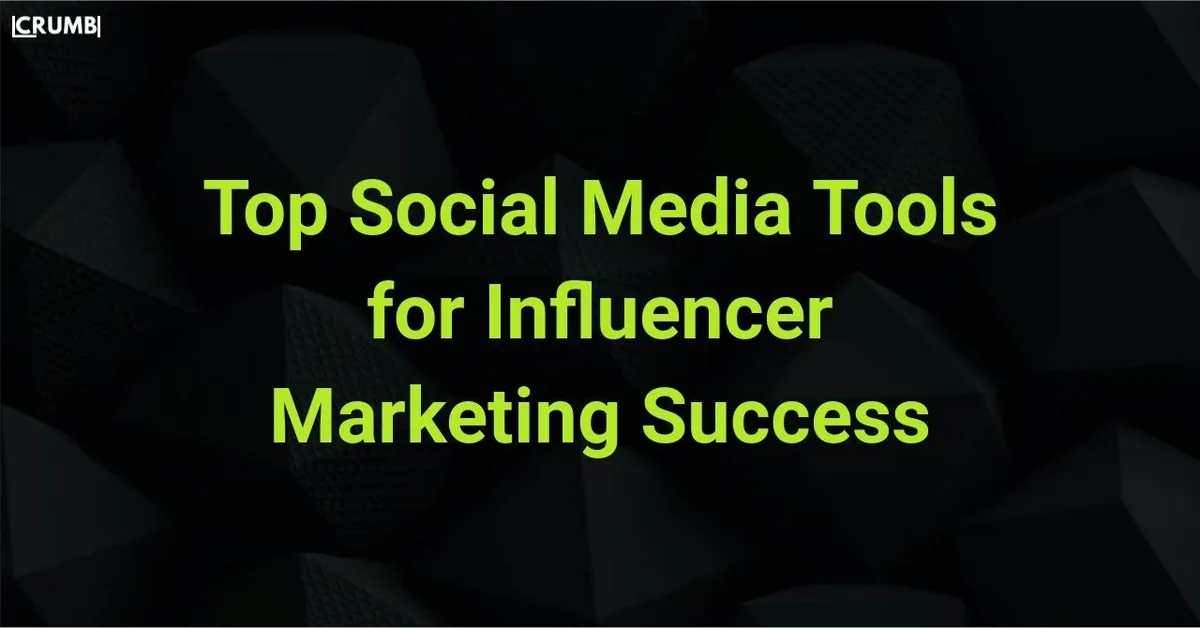Top Social Media Tools for Influencer Marketing Success
Explore social media tools and influencer marketing in this guide. Learn to optimize campaigns, boost brand visibility, and connect with audiences.

Social media has revolutionized the way we connect, share, and market products. As platforms evolve, businesses are turning to influencer marketing to reach their target audiences more effectively. But how can you navigate this ever-changing world?
Enter social media tools and influencer marketing strategies. These powerful resources can help you identify the right influencers, track campaign performance, and maximize your ROI. Whether you're a small business owner or a marketing professional, understanding these tools and techniques is crucial for success in today's digital world.
In this text, we'll explore the top social media tools and influencer marketing tactics that'll take your campaigns to the next level. You'll discover how to leverage these resources to boost your brand's visibility and connect with your audience like never before.
The Rise of Influencer Marketing in Social Media
Influencer marketing has transformed the social media world, revolutionizing how brands connect with audiences. This powerful strategy leverages the influence of individuals with large, engaged followings to promote products and services.
Key factors driving the rise of influencer marketing:
Authenticity: Influencers build trust with their followers, making their recommendations more credible.
Targeted reach: Brands access niche audiences through influencers in specific industries or interest areas.
Cost-effectiveness: Compared to traditional advertising, influencer campaigns often yield higher ROI.
Increased engagement: Influencer content typically generates more likes, comments, and shares than brand-created posts.

Social platforms fueling influencer marketing growth:
Instagram: Visual content and Stories feature make it ideal for product showcases.
YouTube: Long-form video content allows for in-depth product reviews and tutorials.
TikTok: Short-form videos appeal to younger demographics and viral trends.
LinkedIn: Professional influencers drive B2B marketing success.
Influencer marketing tools and technologies:
Influencer discovery platforms: Identify and vet potential influencers based on audience demographics and engagement rates.
Campaign management software: Streamline collaboration, content approval, and performance tracking.
Analytics tools: Measure campaign success through metrics like reach, engagement, and conversions.
As influencer marketing evolves, brands must adapt to changing trends:
Micro-influencers: Partnering with smaller, highly engaged audiences for authentic connections.
Long-term partnerships: Building lasting relationships with influencers for consistent brand messaging.
User-generated content: Encouraging followers to create and share branded content.
By embracing influencer marketing, brands harness the power of social proof and personal recommendations to drive growth and engagement in the digital age.
Key Social Media Tools for Influencer Campaigns
Effective influencer marketing campaigns require robust tools to streamline processes and maximize results. These tools help brands create engaging content, track performance, and identify suitable influencers for their campaigns.
Content Creation Platforms
Content creation platforms are essential for producing high-quality, visually appealing content for influencer campaigns. Tools like Canva and Adobe Spark offer user-friendly interfaces with customizable templates for social media posts, stories, and videos.
Scheduling tools such as Hootsuite and Buffer integrate with these platforms, allowing brands to plan and automate content distribution across multiple social channels.
For video content, platforms like InVideo and Animoto provide easy-to-use editing features, enabling influencers to create professional-looking videos without extensive technical skills. These tools enhance content consistency and save time, which is crucial for maintaining an active social media presence.
Analytics and Tracking Software
Analytics and tracking software provide crucial insights into campaign performance and audience engagement. Tools like Sprout Social and Hootsuite Insights offer comprehensive social media analytics, tracking metrics such as reach, impressions, and engagement rates across platforms.
For influencer-specific analytics, platforms like Klear and Traackr provide detailed performance metrics for individual influencers and campaigns. Google Analytics integrates with social media data to track website traffic and conversions resulting from influencer collaborations.
Advanced features in these tools include sentiment analysis, competitor benchmarking, and ROI calculation, enabling brands to make data-driven decisions and optimize their influencer marketing strategies.
Influencer Discovery Tools
Influencer discovery tools streamline the process of finding and vetting potential brand ambassadors. Platforms like AspireIQ and Upfluence use AI-powered algorithms to match brands with relevant influencers based on factors such as audience demographics, engagement rates, and content themes.
These tools often include features for managing influencer relationships, tracking outreach efforts, and analyzing campaign results. BuzzSumo offers content-focused influencer discovery, identifying thought leaders in specific niches based on their most shared content.
For micro-influencer campaigns, tools like Heepsy and Influence.co provide extensive databases of up-and-coming creators, allowing brands to tap into niche markets and authentic voices.
Developing an Effective Influencer Marketing Strategy
Creating a successful influencer marketing strategy requires careful planning and execution. By following these key steps, you'll maximize the impact of your campaigns and achieve your marketing goals.
Setting Clear Goals and Objectives
Start by defining specific, measurable goals for your influencer marketing campaign. These objectives might include:
Increasing brand awareness
Driving website traffic
Boosting sales or conversions
Enhancing brand reputation
Growing social media following
Establish key performance indicators (KPIs) to track progress, such as engagement rates, click-through rates, or sales attributed to influencer content. Set realistic timelines for achieving these goals and determine your budget allocation.
At Crumb, we emphasize the importance of clearly outlining your objectives to create a focused strategy that aligns with your overall marketing efforts. This clarity enables you to measure success effectively and adapt your approach as needed.
Choosing the Right Influencers

Selecting the right influencers is crucial for campaign success. Consider these factors when identifying potential partners:
Audience alignment: Ensure the influencer's followers match your target demographic
Engagement rates: Look for high levels of genuine interaction on their posts
Content quality: Assess their ability to create compelling, on-brand content
Authenticity: Choose influencers who genuinely resonate with your brand values
Reach: Determine the optimal follower count based on your campaign goals
Use influencer discovery platforms to streamline the search process and access detailed analytics. Conduct thorough vetting by reviewing past collaborations and audience sentiment.
Remember, micro-influencers often offer higher engagement rates and more targeted reach, making them valuable partners for niche markets or specific campaign objectives.
Measuring the Success of Influencer Campaigns
Measuring the success of influencer campaigns is crucial for optimizing your marketing efforts and ensuring a positive return on investment. By tracking key metrics and analyzing data, you'll gain valuable insights into campaign performance and audience engagement.
Engagement Metrics
Engagement metrics provide insights into how well your influencer content resonates with the target audience. Track likes, comments, shares, and saves on posts to gauge audience interest. Monitor follower growth during campaigns to assess brand awaren
ss impact. Analyze engagement rates by dividing total engagements by the influencer's follower count.
Use tools like Sprout Social or Hootsuite to automate data collection and generate comprehensive reports. Compare engagement metrics across different influencers and content types to identify top-performing strategies. Pay attention to sentiment in comments to gauge audience reception and address any concerns promptly.
Conversion Rates
Conversion rates measure the percentage of audience members who take desired actions after exposure to influencer content. Set up unique tracking links or promo codes for each influencer to attribute conversions accurately.
Monitor website traffic, email sign-ups, app downloads, or product purchases originating from influencer content. Use Google Analytics to track user behavior and conversion paths from influencer referrals.
Calculate ROI by comparing campaign costs to generated revenue or lead value. A/B test different call-to-actions or landing pages to optimize conversion rates. Carry out pixel tracking on your website to retarget users who engaged with influencer content but didn't convert initially.
Challenges and Ethical Considerations in Influencer Marketing
Exploring the influencer marketing world requires addressing several challenges and ethical concerns. Transparency issues arise when influencers fail to disclose sponsored content, potentially misleading followers and violating FTC guidelines. To maintain trust, influencers must clearly label paid partnerships and adhere to disclosure regulations.
Authenticity challenges emerge as audiences become more discerning. Overly scripted or inauthentic content can damage both the influencer's and brand's credibility. Combat this by allowing influencers creative freedom within campaign guidelines, fostering genuine connections with their audience.
Measuring ROI presents another hurdle. Unlike traditional advertising, influencer marketing's impact can be difficult to quantify. Carry out robust tracking systems using unique URLs, promo codes, and advanced analytics tools to assess campaign performance and justify investments accurately.
Fraudulent practices, such as buying followers or engagement, pose significant risks. Vet potential influencers thoroughly using tools that detect fake followers and engagement patterns. Prioritize quality engagement over follower count to ensure authentic audience connections.
Privacy concerns intensify as data collection becomes more prevalent. Respect user privacy by obtaining consent for data usage and adhering to platform-specific privacy policies. Carry out strict data protection measures to safeguard collected information.
Influencer burnout and oversaturation in certain niches can lead to diminishing returns. Diversify your influencer portfolio and explore emerging platforms to maintain campaign freshness and effectiveness. Consider long-term partnerships with select influencers to build lasting brand associations.
The Future of Social Media Tools and Influencer Marketing

Social media tools and influencer marketing are evolving rapidly, shaping the future of digital marketing. AI-powered analytics tools will provide deeper insights into audience behavior, enabling more targeted campaigns. Predictive algorithms will optimize content scheduling and performance, maximizing engagement and ROI.
Influencer discovery platforms will become more sophisticated, using machine learning to match brands with the perfect influencers based on audience alignment, engagement rates, and content quality. These platforms will also incorporate real-time performance tracking, allowing brands to adjust strategies on the fly.
Virtual and augmented reality will transform influencer content creation, offering immersive experiences for audiences. Influencers will leverage VR/AR technologies to showcase products in interactive 3D environments, enhancing user engagement and driving conversions.
Blockchain technology will address transparency concerns in influencer marketing. Smart contracts will automate payments and ensure compliance with disclosure regulations. This will build trust between brands, influencers, and audiences.
Micro and nano-influencers will gain prominence, offering hyper-targeted reach and authentic connections. Brands will shift focus to these smaller, niche influencers to drive engagement and conversions within specific market segments.
Social commerce integration will streamline the path from influencer content to purchase. In-app shopping features will allow users to buy products directly from influencer posts, reducing friction in the customer journey and boosting conversion rates.
As social media platforms evolve, new content formats will emerge. Short-form video content, like TikTok and Instagram Reels, will continue to dominate, while interactive content types such as polls, quizzes, and live streams will enhance audience participation and data collection.
Conclusion
Social media tools and influencer marketing have revolutionized brand-consumer interactions. By leveraging these powerful strategies, you can boost your brand's visibility, engage target audiences, and drive conversions.
Remember to choose the right influencers, use appropriate tools, and measure your campaign's success. Stay adaptable as the world evolves with emerging technologies and changing consumer preferences.
Embrace transparency, authenticity, and ethical practices to build lasting relationships with both influencers and customers. With a well-executed strategy, you'll be poised to thrive in the dynamic world of social media marketing.